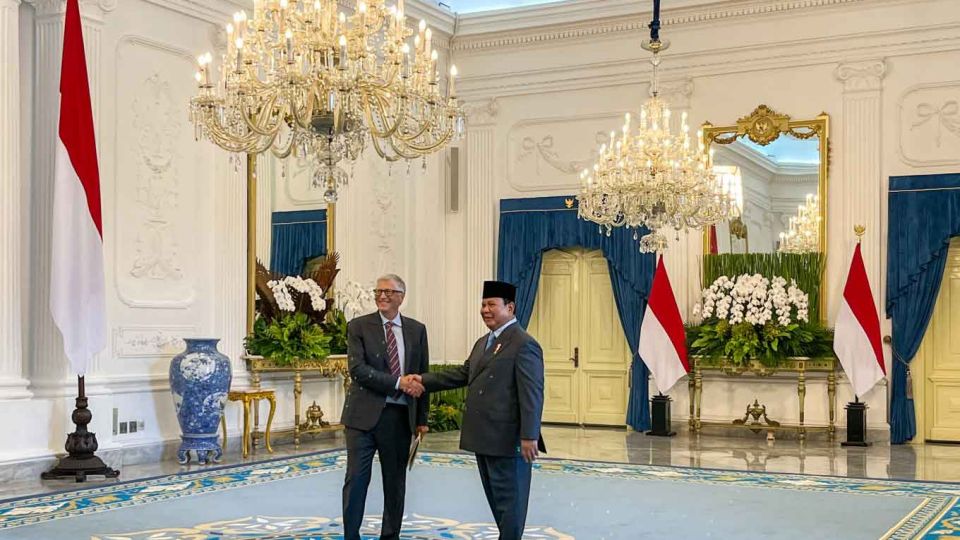May 8, 2025
JAKARTA – Microsoft cofounder and philanthropist Bill Gates has been offered a seat on the advisory board of Danantara, the country’s recently established sovereign wealth fund, as he visited President Prabowo Subianto in Jakarta on Wednesday.
Gates, who chairs the Gates Foundation founded by himself and his then-wife Melinda, also pitched a strategic collaboration with Danantara Trust, the fund’s philanthropic arm, which is being set up to manage endowments and channel charitable grants.
The trust’s focus was inspired by Singapore’s Temasek Foundation, which operates separately from the main sovereign wealth vehicle, Health Minister Budi Gunadi Sadikin said during the meeting at the State Palace, where Gates met several top officials and Indonesian philanthropists.
“I wish Pak Bill could sit on the board together with your friend Pak Ray Dalio, as both of you are already on the Chinese philanthropy board,” said Budi, referring to the China Global Philanthropy Institute (CGPI), a charity-focused initiative cofounded by Gates, Dalio and three Chinese business leaders.
“We have a systematic management [approach] that can help us earn the trust of these [local philanthropists] to provide grants,” he continued.
Danantara unveiled its advisory board in March, naming as members hedge fund titan Ray Dalio, economist Jeffrey Sachs, former Thai prime minister Thaksin Shinawatra, former Credit Suisse CEO Helman Sitohang and Capital Group equity portfolio manager Chapman Taylor.
“Indonesia has vast potential,” Budi said. “If philanthropic giving in developed countries equaled 2 percent of GDP, Indonesia, with its current GDP, could be looking at US$30 billion annually.”
However, he noted that a lack of “trusted entities” had pushed much Indonesian philanthropy overseas. “Therefore, we need a trusted institution,” Budi pointed out.
Danantara CEO Rosan Roeslani told reporters after the meeting that the government planned to allocate between 1 and 2.5 percent of annual dividends from state-owned enterprises (SOEs) to Danantara Trust.
The trust will launch with $100 million in capital this year and aims to grow to $1 billion within six years.
Its focus would include education and health care, and it would “also review SOEs’ [corporate social responsibility] programs to align them with the government initiatives,” he said.
Rosan confirmed that the Gates Foundation had proposed providing grants and collaborating with Danantara Trust in a separate meeting on Tuesday, but he did not disclose any financial details.
“We met with their deputy director, Pippa Zainoeddin, and Southeast Asia representative Jamal Khan. The government has agreed [in principle], and we’re now finalizing [details],” he said.
Founded in 2000, the Gates Foundation is one of the largest private charitable organizations in the world, managing an endowment of around $75 billion as of 2023. Next year, the foundation plans to reach annual distributions of $9 billion.
Prabowo noted that the foundation had donated more than $159 million to Indonesia since 2009, mostly to the healthcare sector, including to fund vaccines.
“Indonesia is one of the countries where we’ve had a long-term partnership,” Gates told government officials at the Palace. “Philanthropy can be a powerful force. If it works well, governments can eventually change how they approach health and education.”
Gates has collaborated with local philanthropic groups like the Tanoto Foundation, founded by Indonesian businessman Sukanto Tanoto, since 2019. The two entities signed a new memorandum of understanding (MoU) on Tuesday to expand regional efforts across Asia.
Gates in his remarks highlighted the potential of artificial intelligence in health, education and agriculture, expressing optimism about its capabilities to discover new tools.
He mentioned upcoming health initiatives in the country, including a tuberculosis vaccine trial. Indonesia ranks second globally for the number of tuberculosis cases, with one person dying every five minutes from the disease.
The foundation also planned micronutrient supplementation and anemia treatment programs, he added, which would be rolled out in the next one or two years.
During the meeting, Prabowo announced his intention to honor Gates for his long-standing contributions to Southeast Asia’s largest economy by awarding him the highest civilian honor during the next United Nations General Assembly summit in New York, the US, in September.
Free meals rollout
Following the Palace event, Gates and Prabowo visited an elementary school in Jakarta to observe students having lunch under the free nutritious meal program, a flagship effort of the President’s announced long before he won the presidential election in February last year.
During a cabinet meeting on Monday, Prabowo said Gates had requested the meeting to “discuss and appreciate” the program, which is committed to serving 82.9 million recipients, more than a quarter of Indonesia’s population, by the end of the year.
National Nutrition Agency (BGN) head Dadan Hindayana said Gates was “impressed” with the program’s scale and ambition, given the massive financial commitment it required.
“He appreciated it, to which Prabowo replied that [the funds] had been prepared by the Indonesian government,” Dadan told reporters after the school visit.


